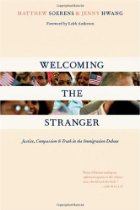 Most of the people who care most passionately about championing the needs of undocumented immigrants are the undocumented themselves, or their relatives or friends.
Most of the people who care most passionately about championing the needs of undocumented immigrants are the undocumented themselves, or their relatives or friends.
That’s human nature—we have enough problems of our own, without caring about other people, right?
If we want to follow Christ well, though, I think there are a number of reasons that we need to care about the situation of immigration in our country.
First of all, there is a strong biblical mandate to care for the immigrant. God repeatedly tells the people of Israel that the law he is giving them “applies to the native-born and to the alien among you” (Ex. 12:49). God sets for his people the standard that immigrants to their land should be treated equally, with the same rights and the same responsibilities. He commands his people to do so at least in part because they have a history of their own—as foreigners living under Egyptian oppression—and he wants them to do better, loving immigrants as they love themselves (Lev. 19:33-34).
Throughout the Hebrew Scriptures, we find God calling out immigrants—along with two other vulnerable groups, orphans and widows—for special attention. God “defends the cause of the fatherless and the widow, and loves the foreigner residing among you, giving them food and clothing” (Deut. 10:18). He did so not just through a sentimental statement of love, but by legislating systems that would ensure that these vulnerable groups’ needs were met, telling the Israelites to go over their grain, grape, and olive harvests just once, leaving the gleanings for the alien, the orphan, and the widow (Deut. 24:19-21). That linkage extends into the prophets, where Ezekiel condemns the rulers of Israel for having “oppressed the alien and mistreated the fatherless and the widow” (Ezek. 22:7).
The New Testament expands upon the idea of hospitality to strangers: Jesus himself says that those who welcome a stranger are welcoming him (Matt. 25:35), while the author of Hebrews suggests that by extending hospitality to strangers, we may be entertaining angels without knowing it (Heb. 13:2). Many Americans think of hospitality as preparing a nice meal for our friends or having a guest room available for extended family, but—while those are certainly noble activities—the biblical ideal of hospitality goes much further, to those unknown to us. Anyone can love his friends, Jesus tells us (Luke 6:33), but to love our neighbor—including those, as Jesus’ parable of the Good Samaritan suggests, may be individuals very different than us who are in need—is a larger task. We do not get to choose who our neighbor is, nor can we except ourselves from the command to love them because they have broken a law.
While responding to God’s explicit commands ought to be enough, there is another reason we would do well to extend hospitality to immigrants: they present a missional opportunity right at our doorstep. Jesus’ Great Commission to his followers was to “make disciples of all nations” (Matt. 28:19); with immigration, the nations show up right at our doorstep. The presence of immigrants, even undocumented immigrants, is not an accident: Scripture suggests that “From one man [God] made every nation of men, that they should inhabit the whole earth; and he determined the times set for them and the exact places where they should live. God did this so that men would seek him and perhaps reach out for him and find him, though he is not far from each one of us” (Acts 17:26-27). God’s hand is in the migration of people precisely because he longs for them to find him.
Missiologists will tell you that immigrants are amongst the most receptive groups of people to the gospel. What a tragedy, then, that as a whole, we do such a poor job of welcoming them. According to the Billy Graham Center, less than one in ten immigrants will be welcomed into the home of any American, to say nothing of an American Christian. If we are willing to take up the challenge, we could see many immigrants enter into a transformative relationship with Jesus Christ.
Finally, we have to care about immigration because it is already an urgent issue within the church. Research by
Todd Johnson of Gordon-Conwell Seminary suggests that immigrant congregations are already accounting for American evangelicalism’s fastest growth, which means that immigration issues are not an issue “out there” but something we have to face within the church. If we believe that the Church is bigger than an individual congregation, but the entirety of the Body of Christ scattered throughout the globe, we cannot dismiss those parts of the body for which immigration issues are a daily reality. Further, “If one part suffers, every part suffers” (1 Cor. 12:26)—and if we are unaware of the suffering that exists within immigrant churches as a result of a dysfunctional immigration system, it is probably because we lack meaningful relationships.
Most white evangelicals regret the way that, for the most part, we sat out on the Civil Rights Movement, leaving our African-American brothers and sisters on their own as they struggled for what we now readily affirm was biblically-mandated justice. This time around, we have the chance to stand with our Latino, Asian, and African brothers and sisters as they struggle for a more just immigration system.
 For a more thorough answer to these questions, we recommend reading chapters 5, 6, and 9 of Welcoming the Stranger: Justice, Compassion & Truth in the Immigration Debate by Matthew Soerens and Jenny Hwang (InterVarsity Press, 2009). To go even deeper in understanding how Scripture, theology, and the church relate to this topic, check out the resource page for further book recommendations.
For a more thorough answer to these questions, we recommend reading chapters 5, 6, and 9 of Welcoming the Stranger: Justice, Compassion & Truth in the Immigration Debate by Matthew Soerens and Jenny Hwang (InterVarsity Press, 2009). To go even deeper in understanding how Scripture, theology, and the church relate to this topic, check out the resource page for further book recommendations.

 Most of the people who care most passionately about championing the needs of undocumented immigrants are the undocumented themselves, or their relatives or friends.
Most of the people who care most passionately about championing the needs of undocumented immigrants are the undocumented themselves, or their relatives or friends.  For a more thorough answer to these questions, we recommend reading chapters 5, 6, and 9 of Welcoming the Stranger: Justice, Compassion & Truth in the Immigration Debate by Matthew Soerens and Jenny Hwang (InterVarsity Press, 2009). To go even deeper in understanding how Scripture, theology, and the church relate to this topic, check out the resource page for further book recommendations.
For a more thorough answer to these questions, we recommend reading chapters 5, 6, and 9 of Welcoming the Stranger: Justice, Compassion & Truth in the Immigration Debate by Matthew Soerens and Jenny Hwang (InterVarsity Press, 2009). To go even deeper in understanding how Scripture, theology, and the church relate to this topic, check out the resource page for further book recommendations.




















Thanks for these straightforward and biblical reminders of the opportunity and privilege to welcome immigrants in Jesus’ name. Please pray for me to find a practical way to do this in my community.
While I have no objection to the presentation of the scriptural points made, context is always extremely important. The contexts of our two eras are monumentally different. The context to which the scriptures speak is a time in which migration of people was not great. Circumcision and the separatism saw to that for those coming into Israel. Second, the immigrant coming into the Old or New Testament context was not that of a State Welfare system. If someone wanted to enter Israel, they made their own way and paid their on taxes. Our current welfare system cannot support the rising cost of immigration and yes immigration suppresses US wages.
Great difficulties often occur when we transmigrate verses intended for individual to individual behaviors to state programs, especially as politics are deeply involved in the current situation.
Finally, nowhere is scripture are we told how many immigrants we are to allow inside a country. There is no Biblical migration policy. Are we to allow 1000 per year or 25,000,000 per year. Scripture provides us without a guide in this matter.